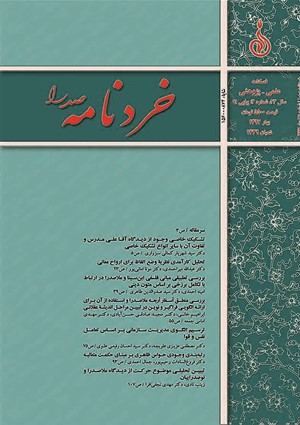بررسي تطبيقي مباني فلسفي ابنسينا و ملاصدرا در ارتباط با تكامل برزخي بر اساس متون ديني
محورهای موضوعی :سید صدرالدین طاهری 1 , امينه احمدي 2
1 - دانشگاه علامه طباطبائی
2 - دانشگاه آزاد اسلامی
کلید واژه: ماهيت نفس تكامل برزخي تكامل اخروي حركت قوه و فعل تجرد مثالي ابنسينا ملاصدرا ,
چکیده مقاله :
در منابع ديني بنا بر منطق وحي، تكامل و ترقي نفس در عالم برزخ مطلبي قطعي و ترديد ناپذير است. اما كيفيت تكامل برزخي و تعارضات احتمالي آن با برخي مباني و قواعد فلسفي، از جمله مسبوقيت هرگونه تكامل به استعداد و حركت و اختصاص استعداد و حركت به ماده، ايجاب ميكند تكامل برزخي تنها از راه شرع ميسر باشد و فيلسوف نتواند امكان تكامل برزخي نفوس را بر اساس مباني عقلي اثبات كند. در ايـن نـوشتـار ابتـدا شواهد نقلي تكـامل برزخـي بـر اساس متون ديني بررسي ميشود و سپس اين امكان با توجه به مباني دو فيلسوف بزرگ اسلامي ـابن سينا و ملاصدرا ـ مورد بررسي و تحقيق قرار ميگيرد و ضمن مقايسه ميان اين دو فيلسوف بزرگ، به اثبات ميرسد كه بر اساس مباني هردوي ايشان در باب حركت، تكامل برزخي غيرممكن است، اما طبق نظر ملاصدرا در مورد تجرد مثالي نفس و اعتقاد وي به بدن مثالي اخروي، زمينة مناسبتري براي تكامل نفس بعد از مرگ تن فراهم ميباشد ولي در حد كفايت نيست.
In religious sources, based on the logic of revelation, the development of the soul in the intermediate world is certain and impeccable. However, the quality of intermediary development and its probable inconsistency certain philosophical principles, such as the necessity for any kind of development to be preceded by potency and motion and allocating them to matter, makes it necessary for this kind of development to be only possible based on religious (Shar‘i) principles. In other words, philosophers might not be able to demonstrate the possibility of the souls’ intermediary development on the basis of rational principles. In this paper, the writers initially examine the traditional proofs for intermediary development based on religious texts and then investigate it in the light of the fundamental principles proposed by two prominent Islamic philosophers, Ibn Sina and Mulla Sadra. After a comparative study of their views, the writers conclude that intermediary development is impossible based on both philosophers’ principles regarding motion. However, they also argue that, given Mulla Sadra’s view of the Ideal immateriality of the soul and his belief in the Ideal Otherworldly body, there is a more appropriate, but not sufficient, context for the posthumous development of the body.
قران كريم.#
آشتياني، سيد جلال الدين، شرح حال و آراء فلسفي ملاصدرا، قم، دفتر تبليغات اسلامي، 1378.#
آشتياني، سيد جلال الدين، شرح زاد المسافر، در: ملاصدرا، زاد المسافر، تهران، اميركبير، 1379.#
ابنسينا، الاشارات والتنبيهات، ج3، با شرح خواجه نصيرالدين طوسي، تهران، مطبعه الحيدريه، 1378.#
ابنسينا، التعليقات، تحقيق عبدالرحمن بدوي، قم، مكتبه الاعلام الاسلامي، بيتا.#
ابنسينا، الشفاء، الطبيعيات، ج1، بكوشش ابراهيم مدكور و سعيد زايد، كتابخانه آيت الله المرعشي النجفي،1404 ق.#
ابنسينا، النفس من كتاب الشفاء، تصحيح حسن حسنزاده آملي، قم، مكتبه الاعلام الاسلامي، 1375.#
ديلمي، حسنبن محمد، ارشاد القلوب، تصحيح ابوالحسن شعراني، مقدمه محمد محمدي اشتهاردي، مترجم علي سلگي نهاوندي، قم، نشر ناصر، 1376.#
صدوق، محمد بن علي بن حسين بن بابويه قمي، أمالي، ترجمة محمد باقر كمرهاي، نشر كتابچي، تهران، بيتا.#
صدوق، محمد بن علي بن حسين بن بابويه قمي، من لايحضره الفقيه، ج1، قم، دفتر انتشارات اسلامي،1413 ق.#
كليني، محمد بن يعقوب، اصول كافي، ج 6، تصحيح و مقدمه علي اكبر غفاري، تهران، دارالكتب الاسلاميه، 1407 ق.#
مجلسي، علامه محمد باقربن محمد تقي، بحار الأنوار، ج6، بيروت، دار احياء التراث العربي، 1404 ق.#
ملاصدرا، الحكمه المتعاليه في الأسفار الأربعه، ج 8، تصحيح، تحقيق و مقدمه علي اكبر رشاد، با اشراف استاد سيد محمد خامنهاي، تهران، بنيادحكمت اسلامي صدرا،1383.#
ملاصدرا، الحكمه المتعاليه في الاسفار الاربعه، ج 9، تصحيح، تحقيق و مقدمه رضا اكبريان، با اشراف استاد سيدمحمد خامنهاي، تهران، بنيادحكمت اسلامي صدرا، 1383.#
ملاصدرا، الشواهد الربوبيه في المناهج السلوكيه، تصحيح، تحقيق و مقدمه سيد مصطفي محقق داماد، با اشراف استاد سيدمحمد خامنهاي، تهران، بنياد حكمت اسلامي صدرا، 1382.#
ملاصدرا، المبدأ و المعاد، تصحيح، تحقيق و مقدمه محمد ذبيحي و جعفر شاه نظري، با اشراف استاد سيد محمد خامنهاي، تهران، بنيادحكمت اسلامي صدرا، 1381.#


